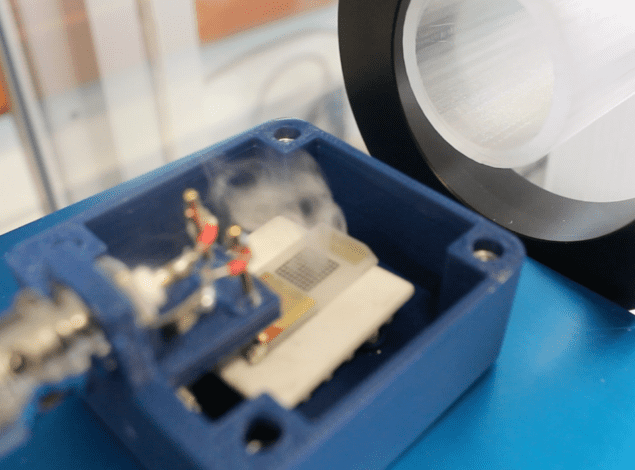
Companies that use physics to unlock next-generation drugs for respiratory disorders and enable advanced cancer treatments are the first recipients of a new award for early-stage companies in healthcare and medicine. Nebu~Flow, a University of Glasgow spin-out that is commercializing an acoustic nebulizer, and Cellular Highways, a Cambridge-based start-up that develops microfluidic devices for use in cell therapies, each received the inaugural Lee Lucas Award and £5000 in prize money as part of the annual Business Awards presented by the Institute of Physics (IOP).
Speaking on 15 July at the first of two webinars dedicated to the 2020 Business Awards, IOP vice-president for business James McKenzie praised Cellular Highways, Nebu~Flow and 11 other award-winning companies for their work in bringing physics-based products to the market. “The awards recognize the significant contribution that physics makes to industry and business, and everyone here has done an incredibly good job of building a business off of physics,” he told the online audience.
Better drug delivery, faster cell sorting
In accepting his company’s award, Nebu~Flow chief executive Elijah Nazarzadeh noted that, thanks to the COVID-19 pandemic, “everyone is now aware of the importance of respiratory disorders”. Even before the coronavirus, though, conditions such as asthma and chronic obstructive pulmonary disease killed one person in the UK every five minutes on average, and Nazarzadeh pointed out that current drug treatments suffer from a significant flaw: the medication doesn’t always reach the right part of the patient’s lungs.

People with respiratory disorders, he explained, typically receive medication via nebulizers – machines that turn liquid drugs into aerosolized, inhalable droplets. The problem is that many of these droplets are too big or too small to reach the tiny air sacs in the lungs where carbon dioxide gets exchanged with life-sustaining oxygen. Nebu~Flow’s award-winning device tackles this problem by using controlled acoustic waves to create a more uniform droplet size, and the strategy seems to be paying off. In pre-clinical trials, the Nebu~Flow device increased the inhalable fraction of a common asthma drug, salbutamol, from 60% to 90%.
Like Nazarzadeh, Cellular Highways’ chief executive Samson Rogers began his talk by focusing on patients. Although cell-sorting technology is already an important tool in basic research, clinical applications such as cell therapies – in which cells are removed from the patient, assessed for their disease-fighting capabilities, and then selectively reintroduced into the body – require sorting speeds and volumes much higher than existing machines can deliver. Cellular Highways’ vortex-actuated cell sorting (VACS) technology works by generating a transient vortex within a microfluidic channel. When this vortex flows downstream, Rogers explained, a cell is carried with it and gently deflected across the streamlines to be sorted. Each deflection takes place within a time envelope of 23 microseconds, making VACS “the fastest chip-based cell sorter yet invented”, according to the award citation.
Entrepreneurial inspiration
The Lee Lucas Award was made possible by a donation from a retired entrepreneurial physicist, Mike Lee, and his wife Ann (née Lucas). The pair were inspired to endow the award after reading a Physics World column in which McKenzie discussed the financial and reputational benefits that awards bring to early-stage companies.
In addition to the two Lee Lucas Award winners, four other firms – Advanced Hall Sensors, Hirst Magnetic Instruments, Promethean Particles and Thornton Tomasetti Defence – received IOP Business Innovation Awards for “delivering significant economic and/or societal impact through the application of physics”. A further seven companies (FeTu, Geoptic, ORCA Computing, Oxford HighQ, OxMet Technologies, Photon Force and QLM Technology) received IOP Business Start-up Awards, which honour companies for physics-based inventions at an earlier stage of commercial development.
Additional information about all 13 award-winners is available on the IOP website.
